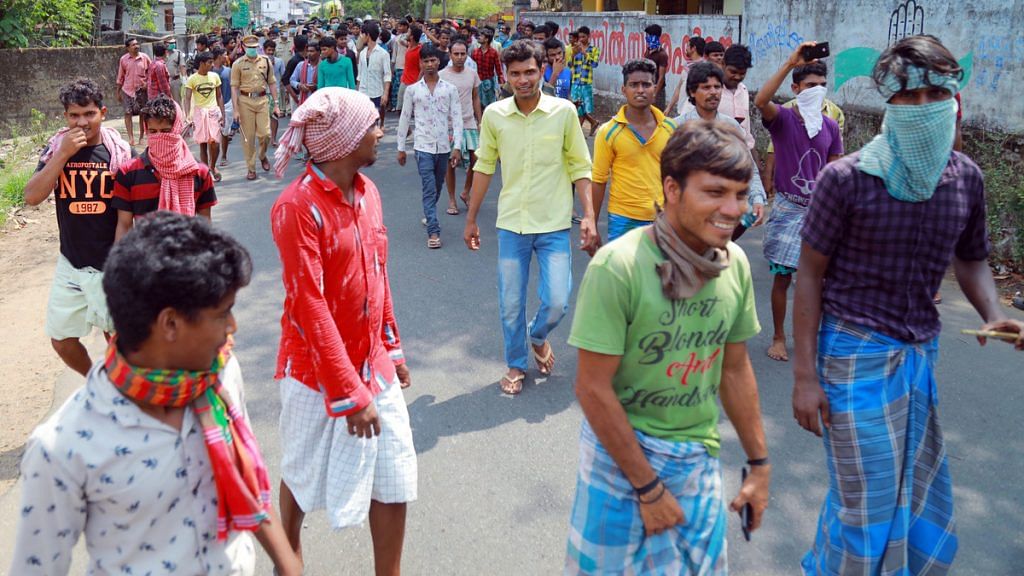Bengaluru: The inter-dependence of districts in the boundaries of two fighting southern states has brought Kerala’s Kasargod in the limelight, with even the Supreme court asking the neighbouring states of Kerala and Karnataka to amicably resolve the issue.
Karnataka has stuck to its stand all through the lockdown period by closing the boundary line with Kerala’s Kasargod because it fears that the Covid-19 hotspot will add to the spread of the disease in its districts of Mangaluru, Udupi, Kodagu and Manipal.
These districts are the ones on which North Kerala’s Kasargod, Kannur and Kozhikode are heavily dependent for not just higher education and employment, but also for super-speciality hospitals.
In the last week or so, Kerala has claimed that five of its citizens have died because Karnataka did not allow the ambulances to enter its territory which had been blocked by an earth mover putting a mountainous heap of mud. Karnataka, on the other hand, has claimed that six of the nine patients who tested positive in Mangaluru were all from Kerala.
Karnataka’s contention is that Kasargod has 114 positive cases and has been listed as the ten Covid-19 hotspots in the country and that it accounts for half of the coronavirus cases in Kerala.
The medical connection
Kasargod’s proximity to Karnataka’s boundary is like Noida’s closeness to New Delhi. But, because it is located closer to the boundary with Karnataka, which has a well-developed education and medical sector, investments in medical infrastructure in Kerala’s northern districts have been inadequate.
This has made people of North Kerala completely dependent upon Mangaluru, Udupi and Manipal for most of its needs. But, this has also led to the supply of human resources from Kerala to the coastal belt of Karnataka.
“By drawing a line on a map, it does not make any difference. Both states have been interdependent on each other. Just as they have been dependent on Karnataka for medical treatment, Karnataka is also dependent on Kerala for their manpower. Most of the medical and paramedical professionals in the Mangaluru -Udupi region belong to Kerala,” explains Prof Pattabhirama Somayaji of the University College, Mangaluru.
“More than 50 to 60 per cent of patients in hospitals in neighbouring Mangaluru and Udupi are from Kasargod. There are three hospitals that have been under construction in Kasargod, but not one of them is operational,” explained a district official on condition of anonymity.
Two super-speciality hospitals which were to come up in North Kerala, one by the Sri Sathya Sai Orphanage Trust and the other on the lines of the AIIMS, Delhi, have not gone beyond the foundation stone laying ceremonies.
A former journalist and a native of Kasargod, C.S. Narayanakutty, explained, “Kasargod has remained backward sheerly because of negligence and the casual attitude of the government towards this northernmost district.”
“This present situation is a wake up call for the political parties to understand that Kasargod needs immediate attention and should be developed. The hospitals in Kasargod don’t have adequate medical facilities to even fight Covid-19 during this time of crisis,” he adds.
Kasargod MLA N.A. Nellikkunnu blames the state government for neglecting the northernmost district of Kerala. When asked about the inordinate delay in completing the construction of the super-specialty hospitals in the district, he defended it saying: “We are in one corner of the state and so development funds reach us late.”
Also read: Power struggle between two top ministers adds to Karnataka’s coronavirus troubles
Cultural connection
Kasargod was earlier part of the South Canara district of the Madras Presidency under the British and even after Independence, it was part of Dakshina Kannada district. Three districts, Udupi, Dakshina Kannada (coastal Karnataka) and Kasargod together formed Tulunadu. But In 1956, when states were reorganised on linguistic lines, Kasargod was merged with Kerala.
“Culturally, emotionally and linguistically, people of Kasargod still feel they are a part of the Kannadiga community. But the governments that ruled over Kerala have neglected Kasargod time and again,’’ said Suresh P, a native of Kasargod.
Political battle
As soon as the Covid-19 cases began to be reported and Karnataka blocked the highway, Karnataka’s tourism minister C. T. Ravi said in a social media post : “Why is CM Pinarayi Vijayan trying to push coronavirus infected patients to Mangaluru? Should Karnataka suffer due to the lack of vision and incompetence of Kerala’s leaders ?.’’
His post reflects the political clash between the two states. Kerala chief minister Pinarayi Vijayan has written two letters in a span of three days to Prime Minister Narendra Modi but has not received a response yet. In the meanwhile, the Kerala Advocates Association moved the Kerala High Court and this was immediately followed up by Kasargod’s Congress MP, Rajmohan Unnithan, moving the Supreme Court.
“There is no fight between Kerala and Karnataka. But the Karnataka government must understand they need to open the borders on humanitarian grounds as we need medical aid,” he said.
Nellikkunnu, pointed out that Karnataka needs to understand the anxiety of the patients who need medical assistance. “Conduct a Covid-19 test before you take them in,” he told The Print.
Also read: Kerala govt urges PM Modi to ensure inter-state movement of goods without restrictions
